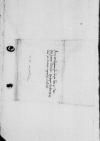Inter omnes incliti Poland (Kingdom of Poland, Polonia)⌊regni PoloniaePoland (Kingdom of Poland, Polonia)⌋ episcopos una Reverendissima Dominatio Tua de facie mihi nota est. Unde factum est, ut et confidentius et frequentius ad Reverendissimam Dominationem Tuam, quam ad alios Polonos litteras dedi. Verum in hanc usque horam nihil prorsus responsi a Reverendissima Dominatione Tua ad manus meas pervenit. Nunc per proprium nuntium iterum scribo, ea spe, ut is Reverendissimam Dominationem Tuam Cracow (Kraków, Cracovia), city in southern Poland, Małopolska, on the Vistula river, from 1038 capital of the Kingdom of Poland⌊CracoviaeCracow (Kraków, Cracovia), city in southern Poland, Małopolska, on the Vistula river, from 1038 capital of the Kingdom of Poland⌋ in regalibus nuptiis[1] inveniat. Misi ad Reverendissimam Dominationem Tuam plerosque libellos et eum, quem nomini tuo dicavi, non semel, quem et nunc mitto, si forte malignitas fortunae ceteros intercepisset. Gratia, eruditio et humanitas tua Regensburg (Ratisbona), city in southeastern Germany, Bavaria, on the Danube river⌊RatisponaeRegensburg (Ratisbona), city in southeastern Germany, Bavaria, on the Danube river⌋ in conventu imperiali probe mihi perspectae sunt. Quare confido fortiter, Reverendissimam Dominationem Tuam non denegaturam esse mihi responsum per hunc certum written over ...⌈... illegible⌈...... illegible⌉tumtum written over ...⌉ et bonae fidei nuntium meum. Qui et alios quosdam e libellis meis Reverendissimae Dominationi Tuae afferet, inter quos unus iuniori regi vestro nuncupatus est. Quem illi acceptum reddere poterit vel unum Reverendissimae Dominationis Tuae verbum gratiosum, quo regiae celsitudini commendetur, saltem a bona voluntate offerentis. De doctissimo viro Ioannes Campensis (Jan van Campen, Ioannes de Campo) (*1491 – †1538), Netherlandish classical philologist and Hebraist, author of a paraphrase of the Book of Psalms from Hebrew to Latin and a Hebrew grammar, in 1531 lecturer at the Collegium Trilingue of Louvain University (CE, vol. 1, p. 255-256)⌊Iohanne CampensiIoannes Campensis (Jan van Campen, Ioannes de Campo) (*1491 – †1538), Netherlandish classical philologist and Hebraist, author of a paraphrase of the Book of Psalms from Hebrew to Latin and a Hebrew grammar, in 1531 lecturer at the Collegium Trilingue of Louvain University (CE, vol. 1, p. 255-256)⌋, qui Reverendissimam Dominationem Tuam comitabatur Regensburg (Ratisbona), city in southeastern Germany, Bavaria, on the Danube river⌊RatisponaeRegensburg (Ratisbona), city in southeastern Germany, Bavaria, on the Danube river⌋, nihil interim accepi, nisi quod ex editione Psalterii eius secunda intellexi eum in Poland (Kingdom of Poland, Polonia)⌊PoloniamPoland (Kingdom of Poland, Polonia)⌋ profectum fuisse. Mitto nunc catalogum libellorum, quos intra breve tempus edidi, et quidem sumptu meo cunctos, ut inde intellegas, quam grave mihi fuerit impensarum onus. Addo et rerum Bohemicarum argumentum, ut videas, quam parum sit mihi otii. Reverendissima Dominatio Tua dignetur, obsecro, omnia in meliorem partem, ut est humanitas tua, interpretari. Bene vale, Praesul eximie, studiosorum patrone semper memorande, Domine clementissime.


 UUB, H. 154, f. 136v
UUB, H. 154, f. 136v